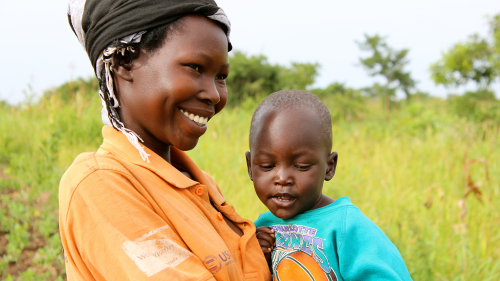Orange Futures, Deforestation Decline, and Ohio Chemical Spill
Check out our roundup of the week's top news and research in food, agriculture, and global development.

Top Story
Genetically Modified Corn Concessions
Mexico announced it would scrap its planned ban on genetically modified (GM) corn for animal feed and industrial use; however, it retains plans to prohibit GM corn for human consumption, as well as the herbicide glyphosate. Secretary of Agriculture Tom Vilsack called the concession disappointing, arguing that GM corn is safe for human consumption.
Council Insights
Dandelions as Food and Medicine
“Through their connection to traditional food practices, dandelions challenge colonized notions of food security, renewing my students’ relationships to traditional food systems and advancing Indigenous food sovereignty,” writes Linda Black Elk in Global Food for Thought. Read the full blog.
 Food and Agriculture
Food and Agriculture
The First 1,000 Days
Esther is one of many mothers who benefitted from the 1,000 Days, a movement focused on providing proper nutrition during the first 1,000 days of a child’s life. Nine years after her son’s birth, Senior Fellow Roger Thurow revisits Esther and other mothers in Uganda to see the longer-term impacts of the 1,000 Days movement on their lives.
 Food and Agriculture
Food and Agriculture
Food & Agriculture
New Zealand Flooding
New Zealand has declared a rare national state of emergency after Cyclone Gabrielle swept across the country’s northern island. Cyclone Gabrielle brought widespread flooding and left a quarter of a million people without power. It also washed away entire farms and left livestock stranded, posing significant issues for the country’s agriculture industry.
Ohio Chemical Spill
As officials investigate the recent derailment of a train carrying toxic chemicals in East Palestine, Ohio, residents are growing concerned about the spill’s impact on human health and the environment. The Ohio Department of Natural Resources said the chemical spill resulting from the derailment killed an estimated 3,500 fish across seven miles of streams, raising fears that the spill will harm livestock. As chemicals seep into the ground, Ohio farmers are also voicing concerns that the spill may have long-term effects on food production. The train derailment and chemical spill is not unique, however. Instead, it represents one of many chemical spills around the world that threaten the environment and food production.
Malaria on the March
A new study suggests that mosquitoes are spreading malaria to new parts of Africa. Malaria, a tropical disease that kills more than 600,000 people annually, has been found to spread through colder and elevated climates. The study concludes that the disease has moved from the Equator by about three miles per year over the past century.
Deeper Dive
Why Does GM Corn Matter?
Mexico is a major importer of US GM corn. Purchasing about 17 million tonnes annually, Mexico makes up a substantial portion of US exports and could seriously hurt farmers’ profits if it stopped GM corn imports. Although Mexico is now considering only banning GM corn for human consumption, that is still 20 percent of the corn it imports from the US.
Resilience
Deforestation Decline
Deforestation in Brazil’s Amazon rainforest dropped 61 percent in January, the first month in office for President Luiz Inácio Lula da Silva. While it is too early to know if this is a long-term trend, Silva promised to relaunch environmental protection efforts and fight Amazon deforestation. Between 17 and 20 percent of the Amazon, the world’s largest rainforest, has been destroyed over the past fifty years.
DC Report
Orange Futures
Breakfast is getting more expensive in the US, with orange juice futures hitting a record high of $2.60 per pound in January, up from $1.40 a year ago. The jump comes as Florida’s citrus harvest suffered from the aftermath of Hurricane Ian and a pandemic of citrus greening hurt groves for over a decade. Growers estimate that up to 90 percent of citrus trees are infected with the bacterial disease, dramatically reducing their orange yields.
Big Actors
Climate Funding
Ireland and Austria have announced efforts to support the African Development Bank’s Africa Climate Change Fund (ACCF) with contributions of €2 million and €1 million, respectively. ACCF aims to improve the African countries’ resilience from climate change and support their transition to low-carbon sustainable development, which includes support for climate-smart agriculture projects. The current trust size is $25.71 million.
Big Ideas
Water Studies
The African Development Bank (AfDB) has announced €201,000 in financing for water basins in Morocco. The studies will explore the feasibility of dams to build large and small water reservoirs and the possibility of connecting several water basins across the country. Connecting the basins would boost the potable water supply, which could help farmers maintain reliable access to irrigation despite the semi-arid climate.
Ask an Expert
How are young people connected to agricultural development, and what does this mean for the future?
“Youth livelihoods in LMICs largely depend on the successful transformation of agriculture, and agricultural and economic transformation will require strong youth engagement to succeed. Simply put, young people need agriculture, and agriculture needs young people. As surging youth populations come of age, how we meet their needs and aspirations—and how well governments integrate them economically, politically, and socially—will shape our shared future.”
— Nonresident Fellow Dr. Kwame Yeboah in Youth for Growth: Transforming Economies through Agriculture


Have a question about food and agriculture? Ask one of our experts at the Center on Global Food and Agriculture to get an answer in next week's Global Food for Thought!
Council Events
Did you miss one of our previous livestreams? Don't worry! They are all available on our website to watch at any time.
Other Upcoming Events
Marbleseed Organic Farming Conference
Date: February 23 - 25
Introducing Pro-WEAI Complementary Indicators for Nutrition-Sensitive Agriculture and Market Inclusion Projects
Date: March 2
Time: 9:00 – 10:30 a.m. ET
Farmers for Climate Action: Rally for Resilience
Date: March 6 - 8
Ukraine One Year Later: The Impact of the War on Agricultural Markets and Food Security
Date: March 8
Time: 9:00 – 10:30 a.m. ET
Green and Growing Summit
Date: May 6
Time: 8:00 – 3:30 p.m. CT
Land Acknowledgement Statement
The Center on Global Food and Agriculture recognizes it occupies the ancestral land of the Kiikaapoi, Peoria, Kaskaskia, Bodwéwadmi, and Myaamia people. Indigenous communities around the world disproportionately experience the pressures of climate change, global conflicts, and the COVID-19 pandemic, while simultaneously stewarding 80 percent of the world’s biodiversity. These Indigenous tribes and nations are the original owners of this land and continue to be systemically erased by policies and practices that ignore their histories. To learn more about Indigenous foodways and practices, check out our 2022 blog series "Stewardship, Sovereignty, and Solutions."
Related Content
- Embracing Dandelions as Food and Medicine
- Going Beyond Regenerative Agriculture on Tribal Lands
- Expanding "638" to Enhance Native American Food Sovereignty
- Flavors and Culture: Food Systems Through Indigenous Women's Eyes
- A Thanksgiving Legacy: Fighting for Indigenous Food Sovereignty
- Native Food Sovereignty: Strengthening Connection to Culture
- Reconnecting to Indigenous Food Sovereignty Values and Practices
- Embracing Interconnectedness: How Indigenous Foodways Can Save Us




